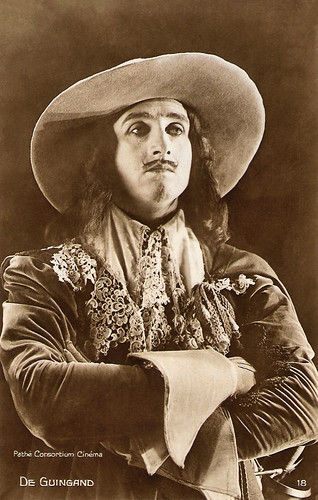
French postcard by Cinémagazine Edition, no. 18. Photo: Pathé Consortium Cinema. Publicity still for Les Trois Mousquetaires (Henri Diamant Berger, 1921).

French postcard by Cinémagazine-Edition, Paris, no. 200. Photo: Alliance Cinématographique. Pierre de Guingand in L'équipage/Last Flight (Maurice Tourneur, 1928).
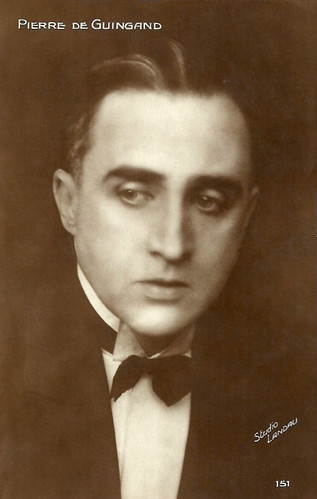
French postcard by Cinémagazine, no. 151. Photo: Studio Landau.
Musketeer Aramis
Octave-Pierre Deguingand a.k.a. Pierre de Guingand was born in Paris in 1885. In 1908, he probably debuted on stage in the play 'Ramuntcho' by Pierre Loti, directed by André Antoine at the Théâtre de l'Odéon. A few years later he performed in the play 'La Pèlerine écossaise' (1914) by Sacha Guitry, at the Théâtre des Bouffes-Parisiens.
In 1921 Guingand played in 'Une danseuse est morte' by Charles Le Bargy, at the Théâtre des Galeries Saint Hubert. Also in 1921, Guingand made his first appearance in the cinema and had a big role right away as Aramis in the 12-episode film Les Trois Mousquetaires/The Three Musketeers (Henri Diamant-Berger, 1921). He also played Aramis again in the sequel Vingt ans après/The Return of the Musketeers (Henri Diamant-Berger, 1922), a 10-episode serial.
Guingand stayed on with Diamant-Berger for the director's subsequent films Le Mauvais Garçon/Bad Boy (Henri Diamant-Berger, 1922) with Maurice Chevalier, L'Emprise/The influence (Henri Diamant-Berger, 1923), and Le Roi de la vitesse/King of the speed (Henri Diamant-Berger, 1923). In the following year, De Guingand played Lodovico Gonzaga in Le Vert Galant/The Courteous Green (René Leprince, 1924), this time a film in 8 episodes, and in 1925 he performed as marquis d'Aurilly in the 8-episode serial Fanfan La Tulipe/Fan Fan the Tulip (René Leprince, 1924), starring Aimé Simon-Girard.
In 1926-1927, De Guingand was absent from the screen, but he performed on stage in plays such as 'Le Prince charmant' (Prince Charming, 1925) by Tristan Bernard, at the Théâtre Michel, and 'Un perdreau de l'année' (A young partridge of the year, 1926), again by Tristan Bernard, and again at the Théâtre Michel.
In 1928, Pierre de Guingand returned to the film set for L'Équipage/Last Flight (Maurice Tourneur, 1928), starring Charles Vanel and Jean Murat, and La Possession/The Ownership (Léonce Perret, 1928) with Italian film diva Francesca Bertini in the female lead.
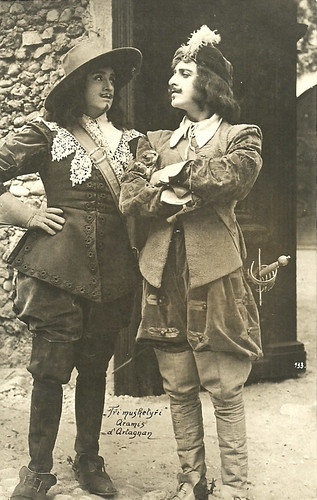
French postcard, no. 133. Pierre de Guingand as Aramis and Aimé Simon-Girard as D'Artagnan in Les trois mousquetaires/The Three Musketeers (Henri Diamant-Berger, 1921).
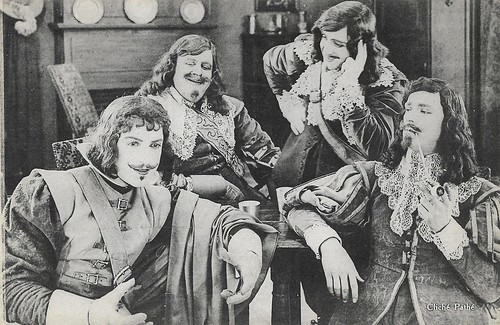
French postcard by M. Le Deley, Paris. Photo: Pathé. Les trois mousquetaires/The Three Musketeers (Henri Diamant-Berger, 1921) with Aimé Simon-Girard as D'Artagnan, Charles Martinelli as Porthos, Pierre de Guingand as Aramis, and Henri Rollan as Athos.
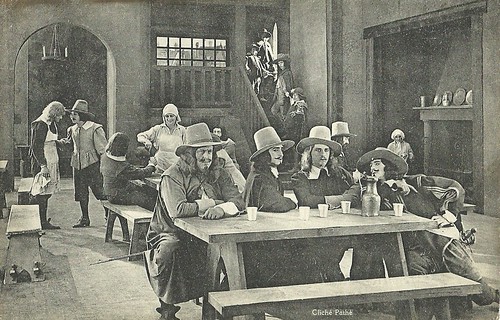
French postcard. Photo: Pathé. Publicity still for Vingt ans après/The Return of the Musketeers (Henri Diamant-Berger, 1922). The four musketeers: Porthos (Charles Martinelli), Aramis (Pierre de Guingand), Athos (Henri Rollan), and D'Artagnan (Jean Yonnel).
Marlene Dietrich's ex-husband
In the late silent film Au bonheur des dames/In the happiness of the ladies (Julien Duvivier, 1929), Pierre de Guingand played Octave Mouret, the rich owner of the department store Au Bonheur des dames, who falls for a young mannequin, Denise (Dita Parlo). Her uncle (Armand Bour), however, owns the little shop Mouret wants to tear down for the expansion of his own department store.
De Guingand also made another remarkable late silent performance in Germany in Ich küsse ihre hand, Madame/I Kiss Your Hand Madame (Robert Land, 1929) starring Marlene Dietrich. Guingand plays the ex-husband of Laurette Gerard (Dietrich), who is still infatuated with her despite the divorce. Laurette starts an affair with a gentleman (Harry Liedtke) until she discovers he works as a waiter. In reality, the waiter is a Russian count though.
In 1931, De Guingand played in the French version of the early sound film Der Ball, Le bal (Wilhelm Thiele, 1931), starring Germaine Dermoz and Danielle Darrieux. Next came La Chance/Luck (René Guissart, 1931) with Marie Bell, the comedy Une faible femme/A Weak Woman (Max de Vaucorbeil, 1932) with Meg Lemonnier, and Chourinette (André Hugon, 1934) with Mireille. He played a supporting part in the classic Le Grand jeu/The big game (Jacques Feyder, 1933) with Marie Bell.
Among his later films were L'Appel du silence/The Call (Léon Poirier, 1936) with Jean Yonnel as North Africa explorer Charles de Foucauld and Guingand as General Laperrine, Sarati, le terrible/Sarati the Terrible (André Hugon, 1937) with Harry Baur in the title role, and finally Remontons les Champs-Élysées/Champs Elysees (Sacha Guitry, 1938) with Guitry himself in a multiple lead role (a.o. Louis XV and Napoleon III) and Guingand as baron de Vitry.
Occasionally Guingand continued stage acting as well, as in 'Le Cyclone' (1931) by Somerset Maugham, directed by Jacques Baumer, at the Théâtre des Ambassadeurs, and 'Tout n'est pas noir' (1941) by André Birabeau, directed by Robert Blome, at the Théâtre Daunou. Pierre Guingand passed away in 1964 in Versailles. He was 79.
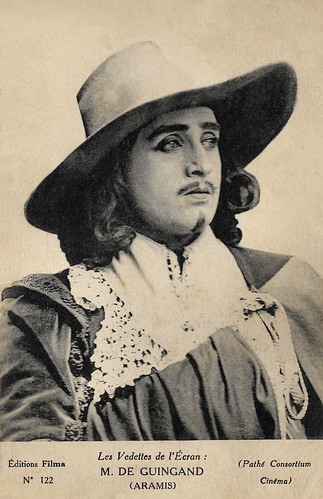
French postcard in the series Les Vedettes de l'Ecran by Editions Filma, no. 122. Photo: Pathé Consortium Cinéma. Pierre de Guingand as Aramis in the period piece serial Les trois mousquetaires/The Three Musketeers (Henri Diamant-Berger, 1921).
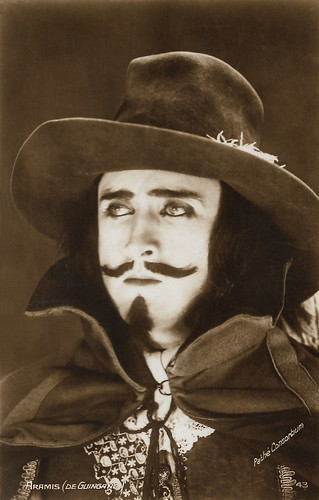
French postcard by Editions Cinémagazine no. 43. Photo: Pathé Consortium Cinéma. Pierre de Guingand as Aramis in Vingt ans après/The Return of the Musketeers (Henri Diamant-Berger, 1922).
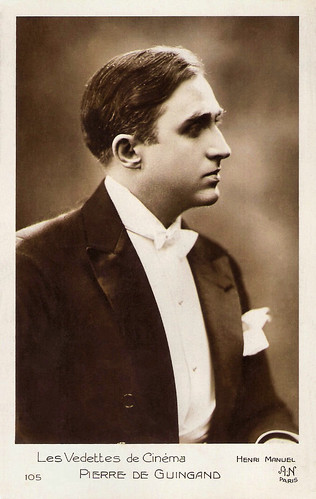
French postcard in the Les Vedettes du Cinéma series by A.N., Paris, no. 105. Photo: Henri Manuel.
Sources: Ciné-Ressources (French), Wikipedia (French) and IMDb.
No comments:
Post a Comment